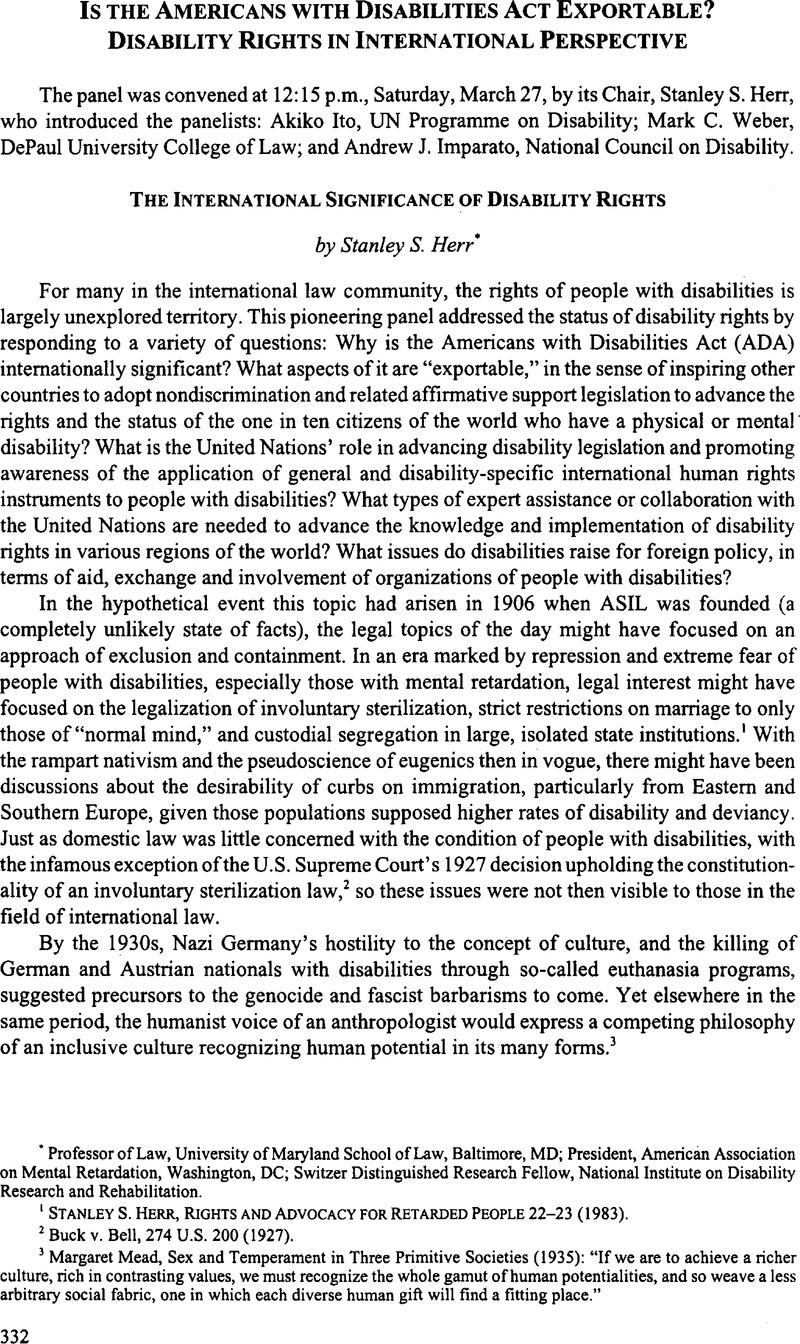Published online by Cambridge University Press: 28 February 2017

1 Stanley S. Herr, Rights and Advocacy for Retarded People 22-23 (1983).
2 Buck v. Bell, 274 U.S. 200 (1927).
3 Margaret Mead, Sex and Temperament in Three Primitive Societies (1935): “If we are to achieve a richer culture, rich in contrasting values, we must recognize the whole gamut of human potentialities, and so weave a less arbitrary social fabric, one in which each diverse human gift will find a fitting place.”
4 Americans with Disabilities Act, 42 U.S.C.A. §§ 12201-12213 (West 1999).
5 42 U.S.C. § 12101(a)(4).
6 Un Standard Rules on the Equalization of Opportunities for Persons with Disabilities, Rule 15(2), U.N.G.A. Res. 48/96 (Dec. 20, 1993).
7 Neta Ziv, Civil Rights and Disability Law in Israel and the United States: A Comparative Perspective (1999). Ziv, a leading proponent of the Israeli law, stated’. “The Israeli disability law has largely built on the Ada as a model for its enactment” (summary, at 1).
8 Canadian Charter of Rights and Freedom, § 15(1) (1982).
9 Dart, a past chair of the U.S. President’s Committee on Employment of People with Disabilities and presidential Medal of Freedom recipient, was a key lobbyist and inspirational speaker in support of Ada.
10 Dart, Justin Jr., Introduction: The ADA: A Promise to Keep, in Implementing the Americans with Disabilities Act xvii (Gostin, Lawrence O. & Beyer, Henry A. eds., 1993)Google Scholar. Dart explained: “Because this is America, the world is watching. If we succeed in keeping the promise of the Ada, the world will follow. If we fail, the world will follow, and it will be a tragedy beyond words or tears.”
11 See, e.g., Hunt, Albert R., The Disabilities Act is Creating a Better Society, Wall Street Journal, Mar. 11, 1999, at A23 Google Scholar.
12 See, e.g., Olmstead v. L.C., No. 98-536 U.S. Sup., (argued Apr. 21, 1999).
13 Sweden Law on Support and Services for Persons with Certain Functional Impairments (1994). The law is analyzed in detail in Herr, Stanley S., Maximizing Autonomy: Reforming Personal Support Laws in Sweden and the United States, 20 J. of Ass’n for Persons with Severe Handicaps 213, 219-223 (1995)CrossRefGoogle Scholar.
14 See, e.g., Individuals with Disabilities Education Act (IDEA) 20 U.S.C. §§ 1400 et seq; Mills v. Board of Education, 348 F. Supp. 866 (D.D.C. 1972) (on enforceability of right to education even in the absence of specific special education laws).